
Lengua y Migracion-Language and Migration
Scope & Guideline
Exploring the Dynamics of Language in Migration.
Introduction
Aims and Scopes
- Language and Identity:
Investigates how language functions as a marker of identity among immigrant communities, including the ways in which language influences social belonging and cultural representation. - Language Acquisition and Education:
Examines methodologies and practices in teaching languages to migrants, focusing on the challenges faced by non-native speakers and the role of educational institutions in facilitating language learning. - Linguistic Attitudes and Perceptions:
Analyzes attitudes towards different languages within migrant populations, including the impact of these attitudes on integration and social dynamics. - Multilingualism and Language Rights:
Explores issues related to multilingualism in migrant communities, including language rights, access to services in multiple languages, and the sociopolitical implications of language use. - Critical Discourse Analysis:
Utilizes discourse analysis to examine how language is used in media and political contexts to shape narratives around migration and immigrants.
Trending and Emerging
- Impact of Technology on Language Learning:
There is an increasing focus on how technology facilitates language learning for migrants, particularly through online platforms and resources tailored for diverse linguistic backgrounds. - Social Integration through Language:
Research is trending towards understanding how language acquisition facilitates social integration for migrants, emphasizing the role of language in accessing services and participation in community life. - Cultural and Linguistic Identity:
Emerging themes include the exploration of cultural identity as it intersects with linguistic practices, particularly how immigrant communities negotiate their identities through language in public spaces. - Critical Examination of Media Representations:
There is a growing trend in analyzing how media represents migrants and their languages, with critical discourse studies highlighting the implications of such representations on public attitudes and policy-making. - Bilingualism and Multilingualism in Urban Contexts:
The journal is increasingly addressing the complexities of bilingualism and multilingualism in urban settings, focusing on how urban diversity shapes language use and community dynamics.
Declining or Waning
- Traditional Linguistic Studies:
There seems to be a waning interest in traditional linguistic studies that do not directly relate to migration contexts, as the journal shifts towards more applied linguistic research that addresses real-world challenges faced by migrants. - Historical Perspectives on Migration:
Research focusing on historical migration patterns and their linguistic outcomes has diminished, possibly due to a greater emphasis on current and immediate issues affecting contemporary migrants. - Narrowly Defined Language Policies:
Discussions surrounding narrowly defined language policies, particularly those that do not consider the complexities of multilingual environments in migration contexts, appear to be less frequent.
Similar Journals

DEUTSCHE SPRACHE
Fostering a Passion for the German Language and Its StudiesDEUTSCHE SPRACHE, published by Erich Schmidt Verlag, is a pivotal journal dedicated to the intricate study of the German language. With its ISSN 0340-9341 and E-ISSN 1866-5233, this publication serves as a vital resource for linguists, educators, and language enthusiasts alike. Spanning diverse topics within the fields of linguistics and language, psychology, and social sciences, the journal has earned a Q3 ranking in Linguistics and Language, alongside a Q4 ranking in both Psychology (miscellaneous) and Social Sciences (miscellaneous) as of 2023. Although the journal is not Open Access, it provides invaluable insights on the developments in German language research from its convergence years of 2002 to 2011 and 2017 to 2023. Positioned in Berlin-Tiergarten, Germany, DEUTSCHE SPRACHE continues to expand its influence and accessibility to researchers, professionals, and students keen on understanding the nuances of linguistic expression in the German language.

Language Policy
Illuminating Language's Role in Society and PoliticsLanguage Policy is a prestigious journal published by Springer, dedicated to the critical examination of language policy across various sociopolitical contexts. Since its inception in 2003, it has rapidly evolved into a leading platform, currently holding a Q1 status in both Linguistics and Language and Sociology and Political Science categories as of 2023. Nestled in the Netherlands, this journal aims to foster interdisciplinary dialogue, providing insights into the intricate relationships between language, culture, and governance. With a commendable impact factor and an impressive ranking in multiple Scopus categories, it is particularly valuable for researchers and professionals seeking to explore current trends and emerging issues in language policy. The journal does not offer open access, ensuring high academic standards and curation of quality research while appealing to a broad audience of academics and industry practitioners. Explore the multifaceted world of language policy through rigorous analysis and impactful studies presented within Language Policy.

Studii de Lingvistica
Navigating the complexities of language and thought.Studii de Lingvistica is a premier open-access journal committed to advancing the field of linguistics and language studies since its inception in 2011. Published by EDITURA UNIV ORADEA in Romania, this scholarly platform aims to disseminate high-quality research that encompasses various aspects of linguistics, encouraging contributions from researchers and professionals worldwide. With an impact factor that reflects its relevance, the journal holds a prestigious position in the Q2 category of Linguistics and Language for 2023. Despite its relatively nascent H-index, Studii de Lingvistica has carved a niche for itself, ranking 1017th and 1094th in Scopus across Arts and Humanities and Social Sciences, respectively. Researchers, scholars, and students alike will find valuable insights and pioneering studies within its pages, making it a vital resource for those engaged in the nuanced exploration of language and its cognitive dimensions. Located at UNIVERSITATII ST NO 1, PAVILION C, ORADEA, BIHOR, ROMANIA, this journal continues to foster academic dialogue and innovation within the linguistics community.

Cuadernos de Linguistica Hispanica
Unlocking Insights into the Hispanic Linguistic LandscapeCuadernos de Linguistica Hispanica is a distinguished open access journal published by UNIV PEDAGOGICA & TECNOLOGICA COLOMBIA, dedicated to advancing research in the field of linguistics and language studies since its inception. With an ISSN of 0121-053X and E-ISSN 2346-1829, this journal has established itself as an important platform for scholars to share innovative findings and insights within the linguistics community. As a Q3-ranked journal in linguistics and language according to 2023 category quartiles, it occupies a significant position in Scopus rankings, showcasing its commitment to quality and relevance. With the aim to foster scholarly discourse and promote understanding of the Hispanic linguistic landscape, the journal welcomes contributions that explore a diverse range of topics and methodologies. The journal has embraced open access since 2008, ensuring that research is accessible to a broader audience, thus enhancing its impact and engagement within both academic and professional spheres.
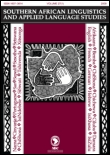
Southern African Linguistics and Applied Language Studies
Championing Research in Linguistics and Language PolicySouthern African Linguistics and Applied Language Studies is a prestigious journal dedicated to the exploration and analysis of linguistics and applied language studies within the Southern African context. Published by Taylor & Francis Ltd, this esteemed journal has established itself as a significant platform for scholars and practitioners since its inception in 2003. With an impressive Q2 ranking in the Linguistics and Language category and a current Scopus rank of #430 out of 1167, it occupies a vital position in the academic landscape, appealing to a diverse readership keen on linguistic research, language policy, and applied linguistics. While the journal is not currently open access, it provides comprehensive insights and scholarly articles that foster understanding and innovation in linguistic practices and language education. As of 2024, the journal continues to deepen its impact through rigorous peer-review and a commitment to advancing knowledge, making it a key resource for researchers, educators, and students seeking to navigate the complexities of language within the Southern African region and beyond.

Journal of Research in Applied Linguistics
Innovating Language Studies for TomorrowJournal of Research in Applied Linguistics is an esteemed academic journal published by Shahid Chamran University Ahvaz, Iran, focusing on the dynamic field of linguistics and language studies. With an ISSN of 2345-3303 and an E-ISSN of 2588-3887, the journal has established itself as a valuable resource for researchers and professionals aiming to explore diverse issues related to applied linguistics, including language acquisition, pedagogy, and sociolinguistic interactions. As part of a robust academic community since its inception in 2017, it is recognized with a Q2 quartile ranking in the world of linguistics and achieved impressive Scopus ranks reflective of its growing impact, particularly within the arts and humanities. The journal embraces an open access policy, enhancing its reach and availability to a broad audience. Researchers, educators, and students alike will find in the Journal of Research in Applied Linguistics a critical platform for dialogue, innovation, and contribution to the evolving landscape of language research.
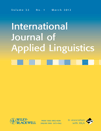
International Journal of Applied Linguistics
Bridging Gaps Between Linguistic Theory and Real-World ApplicationsInternational Journal of Applied Linguistics, published by WILEY, is a premier platform for cutting-edge research in the field of applied linguistics. With a notable Impact Factor and ranked in the top Q1 quartile of linguistics and language, this journal serves as an essential resource for scholars, practitioners, and students. The journal’s wide-ranging scope includes various subfields such as language acquisition, language education, sociolinguistics, and discourse analysis, fostering multidisciplinary approaches to language studies. It has achieved a significant Scopus Rank, placing it in the 90th percentile for both Arts and Humanities as well as Social Sciences categories, reflecting its high visibility and influence in the academic community. The International Journal of Applied Linguistics is committed to advancing the understanding of language use in real-world contexts through rigorously peer-reviewed articles that contribute to both theory and practical applications. While it is not an open-access journal, it remains a highly respected publication for researchers looking to disseminate and acquire knowledge in applied linguistics.
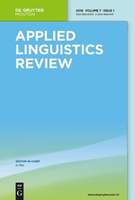
Applied Linguistics Review
Championing high-quality research in language acquisition.Applied Linguistics Review is a leading academic journal published by WALTER DE GRUYTER GMBH, focusing on the dynamic field of linguistics and language studies. With an impressive Q1 quartile ranking in both Linguistics and Language and Social Sciences, the journal positions itself at the forefront of research, making it a crucial resource for scholars and professionals alike. The journal aims to foster scholarly dialogue by publishing high-quality, peer-reviewed articles that explore theoretical frameworks, empirical studies, and innovative methodologies in applied linguistics. Operating from Poland with an international reach, it is committed to advancing knowledge in areas such as language acquisition, language policy, and multilingualism. Its notable performance can be seen in its Scopus rankings, where it stands at #72 out of 1088 in the Arts and Humanities category and #86 out of 1167 in Social Sciences. The Applied Linguistics Review serves as an invaluable platform for researchers, educators, and students to disseminate and engage with cutting-edge research, thereby enhancing their understanding and application of linguistic principles in diverse contexts.
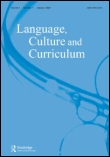
Language Culture and Curriculum
Cultivating Knowledge at the Nexus of Language and CurriculumLanguage Culture and Curriculum is a premier academic journal published by Routledge Journals, Taylor & Francis Ltd, dedicated to advancing knowledge in the fields of Education and Linguistics. With a distinguished history since 1988 and converging through to 2024, this journal is highly regarded, reflecting its exemplary standing with a 2023 Q1 ranking in both Education and Linguistics. Currently among the top 3% of publications in Language and Linguistics and ranked 27th in Social Sciences, Language Culture and Curriculum fosters the exploration of language education within diverse cultural contexts. Through rigorous peer-reviewed research, it serves as an essential platform for researchers, educators, and policymakers alike, promoting innovative practices and theoretical frameworks in language teaching and curriculum development. Although it does not offer Open Access, the journal remains an invaluable resource in academic circles, supporting scholarly discourse and advancing educational methodologies.
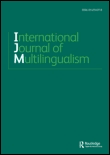
International Journal of Multilingualism
Championing impactful research in language studies.Welcome to the International Journal of Multilingualism, a leading platform dedicated to advancing the field of linguistics and language studies. Established by ROUTLEDGE JOURNALS, TAYLOR & FRANCIS LTD and housed in the United Kingdom, this journal has rapidly ascended to a prestigious Q1 quartile status in both the Linguistics and Language categories as of 2023, ranking in the top 4% across related disciplines. With a remarkable Scopus ranking of #35 in Arts and Humanities and #38 in Social Sciences, it is recognized for publishing high-quality, impactful research that spans a diverse array of multilingual topics. The journal thrives on its commitment to examining the complexities and dynamics of multilingualism in contemporary society, making it an essential resource for researchers, professionals, and students alike. Although Open Access options are not currently available, the journal's rigorous peer-review process ensures that each publication contributes valuable insights into the field. Since its inception in 2004, the International Journal of Multilingualism continues to foster academic discourse and innovation, solidifying its role as a crucial outlet for scholarly work by 2024 and beyond.